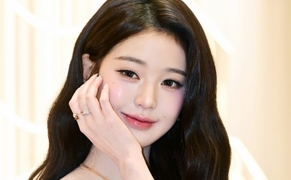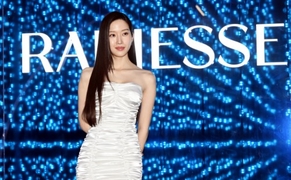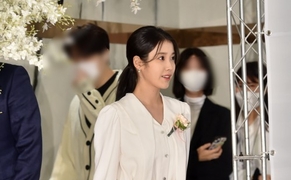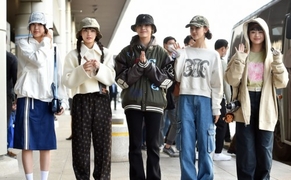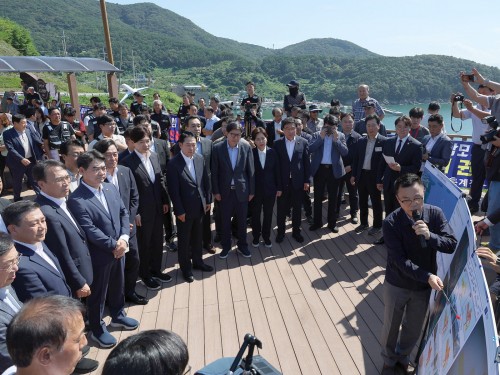 |
| Jang Dong-hyuk, leader of the People Power Party (PPP), visits the Daehang Observatory on Gadeokdo Island in Gangseo District, Busan, with party leaders and lawmakers from the Busan–Gyeongnam region on September 14 to receive a briefing on the new Gadeok airport project. / Source: Yonhap News |
The People Power Party (PPP) is seeking to capitalize on rifts within the ruling camp, spotlighting “leadership defects” amid a spat between the Democratic Party of Korea’s (DPK) two top leaders and mixed signals between the party and the government. The conservative party is also toying with an out-of-parliament protest drive, fueling talk of a possible “big right-wing alliance.”
According to political sources on September 14, the fallout from the collapsed deal on three special prosecutor bills (insurrection, first lady Kim Keon-hee, and the late Sgt. Chae) prompted PPP floor leader Kim Byung-ki—who had publicly demanded an apology from DPK chair Jung Chung-rae—to bow on Sunday, saying he was “sorry for causing concern.” Still, Judiciary Committee Chair Choo Mi-ae, a senior DPK figure, criticized the process as “rushing for results under a deadline,” suggesting embers of intra-party discord remain.
While Kim’s apology appears to have pushed the “two-top conflict” below the surface, observers warn that policy dissonance between the government and ruling party on contentious issues like prosecution reform remains a red flag. Seizing on the noise, the PPP is moving to turn it into a “momentum shift,” highlighting what it calls a power struggle between President Lee Jae-myung and Chair Jung to weaken the ruling camp’s base.
PPP leader Jang Dong-hyuk, marking the administration’s 100th day, quipped that Korea now has “three separate communications, not three branches,” claiming there is a “Yongsan president Lee Jae-myung, a Yeouido president Jung Chung-rae, and a Chungjeong-ro president Kim Eo-jun,” and that the “invisible president” is the hard-core fan base known as “gae-ddal.” By likening Jung to the “real power in Yeouido,” Jang took aim at what he described as a dual leadership structure swayed by militant supporters.
With the ruling party pushing an aggressive legislative agenda after tearing up the special prosecutor deal and the PPP unlikely to secure procedural control, calls are growing inside the conservative bloc for right-wing unity and street protests. At a September 12 rally denouncing “opposition suppression,” Rep. Lim Ee-ja urged an end to “subtraction politics,” saying conservatives should unite despite differences with pastor Jeon Kwang-hoon, commentator Jeon Han-gil, and former PPP chief Lee Jun-seok.
PPP Supreme Council member Kim Min-su has been beating the drum for street demonstrations at Gwanghwamun. If the National Assembly forces through, on September 25, bills to abolish the state prosecution service under a government reorganization plan and to create a special insurrection tribunal, the party is leaving the door open to a “large-scale outdoor rally.”
Still, party leaders worry that moving the fight to the streets could, regardless of intent, merge the PPP with the “asphalt base” of hard-line activists, giving the ruling party an opening to attack. There are also concerns that dormant internal strife could reignite among pro-impeachment factions. Jang has said the “big right-wing alliance” card could be played “if necessary.”
Most Read
-
1
-
2
-
3
-
4
-
5
-
6
-
7

















